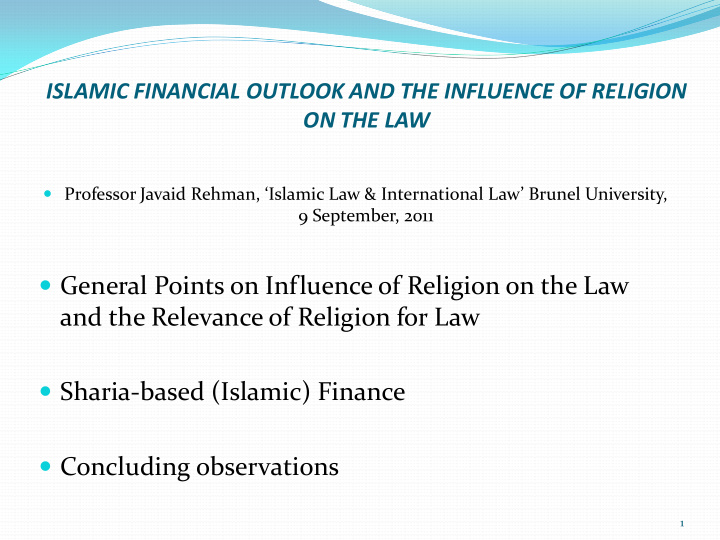



ISLAMIC FINANCIAL OUTLOOK AND THE INFLUENCE OF RELIGION ON THE LAW Professor Javaid Rehman, ‘Islamic Law & International Law’ Brunel University, 9 September, 2011 General Points on Influence of Religion on the Law and the Relevance of Religion for Law Sharia-based (Islamic) Finance Concluding observations 1
Influence of Religion and the Relevance of Religion for Law Religion, the place of religion in public & private life – one of the contested areas in international & national laws International Law – Religion remains contested & controversial (i) Inability on agreement over definition ‘Religion’ or ‘Belief’ Religious based discrimination one of the difficult areas to monitor & (i) prevent 2
Religion & Law – National level Relevance of Religion cannot be overstated: Considerable influence of religion on society and Law in everyday life – evident in e.g. Public holidays and observance of religious holidays; Closure of businesses (e.g. on particular days) or generally (e.g. gambling and horse racing etc) or prohibition of sale of goods (e.g. alcohol, pork etc) Role of Religion in society and Public life: Freedom of expression, freedom of the media (c.f. Blasphemy laws in Pakistan) The position of women in society, The wearing of religious symbols; the wearing of veil, headscarves and religious symbols; Religious obligations during employment (exemptions e.g. time-off for Friday prayers etc) Religious education in Schooling (Content of education, role of faith-based schooling); 3
Religion & Law – National level Lichtenstein (Roman Catholic Church): State Church, Costa Rica (Roman Catholic religion): State religion. Greek Orthodox Church (official Church) & Greece’s official State religion. Lutheran Church (State religion) Denmark, Iceland, Norway and Finland. Islam (State Religion): Afghanistan, Algeria, Bahrain, Brunei, Comoros, Jordon, Kuwait, Libya, Malaysia, Maldives, Mauritania, Morocco, Pakistan, Qatar, Saudi Arabia, Somalia, Tunisia, UAE, Yemen, Iran, Iraq, Oman etc. Buddhism (State Religion): Bhutan, Cambodia, Sri Lanka, & Thailand. Israel, without officially proclaiming Judaism (State Religion), supports Jewish institutions. France (separation of State & religion) religion continues to have weight. India: religion carries weight and significance in laws e.g. application of personal laws. United Kingdom: Role & significance of (Anglican church). 4
Relevance of Religion for society Religion and application of Personal and family law : specialist regimes in e.g. marriage (formalities and capacity to enter (i) a marriage validity of arranged or forced marriages, recognition of polygamous marriages) divorces, (ii) (iii) inheritance, custody etc. (iv) Law and Religious organisations and Religious institutions Requirements of Registration (i) Tax breaks: tax exemptions for (register) religious organisations & (ii) institutions (iii) Failure of recognition or to register (illegitimacy); possible characterisation as illegal or terrorist organisation (followers prevented for raising money) 5
Influence & Role of Sharia Sharia: Islamic law, (but not confined to law) note holistic concept of Shaira : meaning – ‘road to the watering place’ Sharia , (i) covers wide range of secular laws and ordinances, & moral & ethical behaviour. (ii) based upon the Quran and Sunna (tradition & practices) as primary sources, and upon Ijma (consensus), Qias (analogy/deduction) & Ijtihad (independent legal reasoning) secondary sources. (iii) not monolithic system– remain substantial differences interpretation & application of the Quran and the Sunna . The development of a body of positive law task of time & effort – Sunni and Shia Schools. 6
Sharia and Islamic Finance Value Driven Business Practice Values? - regulation of all aspects of public & private life - Human actions (either objectively good or inherently bad) - Visualise Islam as a religion & civilization - General principles laid down, with specific instruments for regulation of commercial life 7
Values of Islamic Finance Doctrine of Fairness in commercial law and enterprise help develop ethical economic model (with market forces being protected from unfair manipulation) Prohibitions: Riba (interest) 1. Gharar (uncertainty) 2. Qimar (Gambling) 3. 8
Prohibition on Riba In Arabic meaning ‘increase’ commonly translated ‘interest’ - underlying principle: any excess amount over the principle amount that a creditor has agreed to receive from debtor (merely for the time) is Riba and Haram . Quranic references to Riba (as Usury ) – all four passages concerned (less with purposes of usage) but conditions on which money made available to counterparty. Purpose clearly must be halal Types of Prohibition: (a) Riba al-Jahiliyya (continuous multiplying debt, where maturity on debt swapped with bigger debt for longer maturity): Pre-Islamic Innovations/variants (b) Riba Alfadhl (Riba of excess) – exchange of units of same merchandise allowed, but must be equal in quality and quantity (c) Riba Alnisiyah (Riba of delay) – (deferred payment in money or kind) 9
Prohibition on Riba Underlying principle : Distribution of wealth based on the doctrine of fairness: Islamic system prohibits making of profit/benefit (monetary or otherwise Prohibited). Loans are purely charitable. Asset Sales and leases substituted for interest-bearing loans (parties share profit and loss fairly). Return of capital tied to success in venture – similar to venture-capital & partnership in modern commercial world (note difference as Riba would impact, e.g. profit & loss; liquidation preference provisions). Sale of debts (including e.g. discounting of bills, securitization etc.) prohibited as Unjust enrichment Fee charged for business practice must not be variable – increase of fee with size of transaction is Riba 10
Prohibition of Gharar (uncertainty) Gharar (uncertainty) impermissible. Existence of (excessive) uncertainty in commercial transactions may lead to unjust enrichment Individual cases – as some uncertainty inevitable part of commercial agreements (c.f. difficult for Courts to decide – level of uncertainty) E.g. Sale of an object that did not exist or not yet in control of the seller?? E.g. Gambling?? 11
Prohibition of Qimar (gambling) Note: Overlap with principle of Gharar (excessive uncertainty) Qimar – exemplified: trading in financial risk (see as form of gambling, & prohibited by Islamic law) 12
Conclusions: Highlighted: Considerable influence of Religion upon law Place of religion in society remains contested & controversial Essential principles of Shaira -based finance: underlying ethos – (a) fairness, equity (b) Prohibitions based on ‘unjust enrichment’. 13
Recommend
More recommend